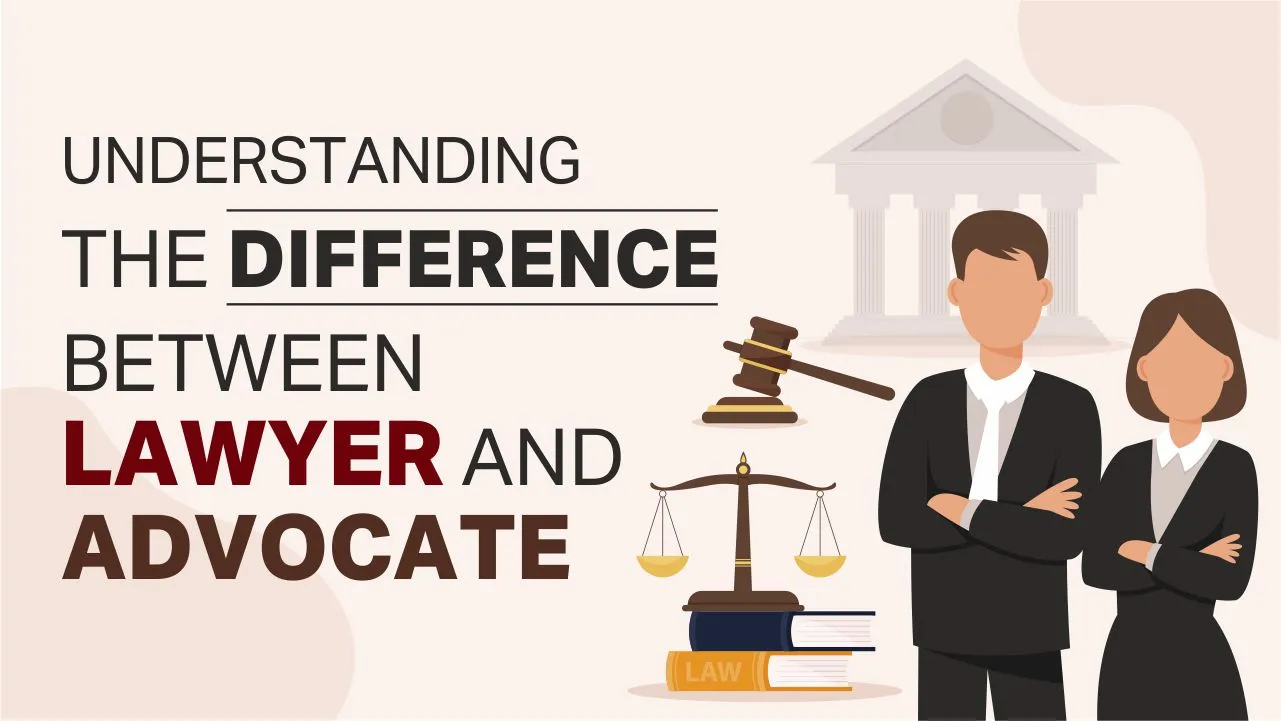
Understanding the Difference Between Lawyer and Advocate
In legal matters, the terms “lawyer” and “advocate” are often used interchangeably. Lawyers and advocates are the professionals who present legal evidence in courts of law so that legal redress can be obtained.
While these two words are often used interchangeably, they have some fundamental differences. The purpose of this article is to explain the difference between a lawyer and an advocate in layman’s terms!
Who is called a lawyer?
A lawyer is a professional who has completed their legal education and obtained a law degree. They are authorized to provide legal advice, draft legal documents, represent clients in legal matters, and advocate for their client’s interests.
Lawyers have a deep understanding of the law and its applications. They are trained to analyze legal issues, and research relevant cases and statutes. They guide individuals, businesses, or organizations seeking legal assistance.
Lawyers can specialize in various areas of law, such as criminal law, civil law, corporate law, family law, intellectual property law, etc. They can work in law firms, government agencies, corporate legal departments, non-profit organizations, or as independent practitioners.
Their responsibilities include conducting legal research and advising clients on legal matters. Also, they deal in preparing contracts and legal documents, negotiating settlements, and representing clients in court proceedings.
Who is called an Advocate?
An advocate is a specific category of lawyers who are authorized to represent clients in court proceedings. In some jurisdictions, the term “advocate” is used to refer specifically to lawyers who are registered with the Bar Council. They have the right to appear before courts and present cases on behalf of their clients.
Advocates have fulfilled additional requirements beyond obtaining a law degree. These requirements may include passing a bar examination and completing a period of practical training. The training must full filling specific criteria set by the regulatory body governing the legal profession in their jurisdiction.
The role of an advocate primarily revolves around litigation. They are responsible for preparing legal arguments and presenting cases before judges or juries. Besides, they cross-examined witnesses, presented evidence, and advocated for their client’s interests in court.
Advocates possess the necessary skills and knowledge to navigate the complexities of the courtroom and present their clients’ cases effectively.
It’s important to note that the usage of the term “advocate” and the specific requirements for becoming an advocate may vary between countries and legal systems.
In some jurisdictions, the term “advocate” may have a broader meaning. It encompasses all lawyers who practice law, while in others, it may refer specifically to lawyers who are registered and authorized to appear in court.
Difference Between Lawyer And Advocate in points
Here are some key points highlighting the differences between a lawyer and an advocate:
1. Lawyer
- A lawyer is a general term used to refer to a person who has obtained a law degree and is qualified to provide legal advice and services.
- Lawyers may specialize in various areas of law such as criminal law, civil law, corporate law, family law, etc.
- They can work in law firms, government agencies, corporate legal departments, non-profit organizations, or as independent practitioners.
- Lawyers may engage in legal research, drafting contracts, providing legal advice, negotiating settlements, and representing clients in non-courtroom matters.
- They may or may not have the authority to appear in court and represent clients in litigation.
2. Advocate
- An advocate is a subset of lawyers who have fulfilled additional requirements. They are authorized to represent clients in court proceedings.
- Advocates focus primarily on litigation. They have the right to present cases before judges or juries, cross-examine witnesses, and present evidence in court.
- They are registered with the Bar Council or a similar regulatory body and have met the specific criteria set by the jurisdiction.
- Advocates are equipped with the necessary skills and knowledge to navigate the complexities of the courtroom and advocate for their client’s interests.
- Their role is limited to courtroom representation, and they may not engage in non-litigation legal activities to the same extent as lawyers.
3. Licensing and Registration
- Lawyers may need to pass a bar examination or fulfil other licensing requirements to practice law in their specific jurisdiction.
- In some jurisdictions, there are required to pass a specific bar examination and enrol with the Bar Council to be recognized as authorized representatives in court.
4. Court Representation
- Lawyers who are not registered as advocates may still be involved in legal matters but may not have the right to represent clients in court.
- Advocates have the exclusive right to represent clients in court proceedings, present cases, cross-examine witnesses, and present evidence on behalf of their clients.
Conclusion
While the terms “lawyer” and “advocate” are often used interchangeably, the legal system in India recognizes the difference between lawyer and advocate. Lawyers possess a law degree and can provide legal services and advice.
On the other hand, advocates are a subset of lawyers who have undergone additional training. They are registered with the State Bar Council. Advocates have exclusive rights to represent clients in court. They are subject to stricter regulations and professional ethics. Understanding the differences between lawyers and advocates is essential for individuals seeking legal assistance in India and for aspiring legal professionals.
Also Read: Top 10 Essential Skills Needed to Become a Lawyer
Recent Post
